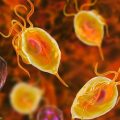How Can You Get Trichomoniasis If No One Cheats
What is trichomoniasis?
Trichomoniasis is an infection caused by a parasite that can occur in both men and women, but is more common in women. In men, the infection occurs in the tube that carries urine out of the body (the urethra) as well as in the prostate.
In women, the infection occurs most often in the genital. In most cases, the infection is transmitted during sex with an infected person. In women, however, in addition to contracting trichomoniasis through sexual contact, the infection can develop if another, pre-existing infection is present.
How do people get trichomoniasis?
The parasite passes from an infected person to an uninfected person during sex. In women, the most commonly infected part of the body is the lower genital tract (vulva, cervix, or urethra). In men, the most commonly infected body part is the inside of the urethra. During intercourse, the parasite usually spreads both ways. It is not common for the parasite to infect other body parts, like the hands, mouth, or anus. It is unclear why some people with the infection get symptoms while others do not. It probably depends on factors like a person’s age and overall health. Infected people without symptoms can still pass the infection on to others.
What are the signs and symptoms of trichomoniasis?
About 70% of infected people do not have any signs or symptoms. When trichomoniasis does cause symptoms, they can range from mild irritation to severe inflammation. Some people with symptoms get them within 5 to 28 days after being infected. Others do not develop symptoms until much later. Symptoms can come and go.
Men with trichomoniasis may notice:
- Itching or irritation inside the male genitals;
- Burning after urination or ejaculation;
- Discharge from the genitals.
Women with trichomoniasis may notice:
- Itching, burning, redness or soreness of the genitals;
- Discomfort with urination;
- A change in their discharge (i.e., thin discharge or increased volume) that can be clear, white, yellowish, or greenish with an unusual fishy smell.
Having trichomoniasis can make it feel unpleasant to make out. Without treatment, the infection can last for months or even years. Click Here to Read : All You Need to Know About Trichomoniasis
You can have trichomoniasis without having symptoms. Most men who get the infection often do not have symptoms. Infected people who do not have symptoms can still spread the infection. Several studies have been carried out on the association between trichomonas vaginalis and other organism that cause similar infections, one particular study demonstrated the association between Trichomonas vaginalis and vaginitis, candidiasis, bacterial vaginosis. While another distinct study revealed the association between maternal trichomonas vaginalis and intellectual disability in children. Although rare, Trichomonas vaginalis could be transmitted prenatally and cause respiratory and vaginal infections in neonates. Having trichomoniasis can mean one is already infected with other sexually transmitted diseases (STDs) which may include Chlamydia and both are curable. However, treatment may differ. It is important therefore to have yourself tested before treatment begins so as to know the specific treatment required.
If I have Trichomoniasis Does It Mean My Boyfriend, Girlfriend or Partner Cheated?
Trichomoniasis infection cannot be used as a definite benchmark for infidelity or unfaithfulness even though the disease is transmitted primarily by sexual activity. Even if both partners are faithful, a Trichomonas vaginalis infection acquired prior to the relationship can persist if left untreated. This is why it is advised to see your doctor for a follow-up test for trichomoniasis at least three months after the completion of your treatment.
The reinfection rate for women is almost as high as 17 percent in the three months after treatment. It is also important to note that reinfection is possible even if your partners were treated as well. An estimated 1 in 5 persons get infected again within 3 months after receiving treatment. In a cross-sectional study conducted in Zambia, adolescent virgin girls showed a high prevalence of trichomoniasis, as a result of sharing of bathing water. This explains why you get trichomoniasis if no one cheats.
Do You Get Trichomoniasis From Toilet Seat or Towel?
Although trichomoniasis is usually transmitted sexually, it can sometimes be transmitted by non sexual means like damp or moist objects such as towels, wet clothing, or a toilet seat, a classical case of such transmission is seen in the case of the Zambian adolescent virgins who showed a high prevalence of trichomoniasis, as a result of sharing of bathing water. This proves that trichomoniasis is not always sexually transmitted. This is possible because trichomonads survive best in warm or moist environments. There is a high possibility of infection being transmitted in whirlpools or similar warm public baths and so women with trichomoniasis are advised to stay out of public baths so that the condition does not spread. This also explains why you can get trichomoniasis without being sexually active.
Can a Child Get Trichomoniasis?
Trichomoniasis may be spread from a mother to her baby during a vaginal delivery, but this is also rare. Girls can easily get trich from their infected mothers if they share items like towels or bathrooms. Symptoms of a trich infection in young children may also be a sign of sexual abuse.
What are the complications of trichomoniasis?
Trichomoniasis can increase the risk of getting or spreading other sexually transmitted infections. For example, trichomoniasis can cause genital inflammation that makes it easier to get infected with HIV, or to pass the HIV virus on to a sex partner.
How is trichomoniasis diagnosed?
It is not possible to diagnose trichomoniasis based on symptoms alone. For both men and women, your health care provider can examine you and get a laboratory test to diagnose trichomoniasis.
What is the treatment for trichomoniasis?
Trichomoniasis can be treated with medication (either metronidazole or tinidazole). These pills are taken by mouth. It is safe for pregnant women to take this medication. It is not recommended to drink alcohol within 24 hours after taking this medication.
People who have been treated for trichomoniasis can get it again. About 1 in 5 people get infected again within 3 months after receiving treatment. To avoid getting re-infected, make sure that all of your sex partners get treated. Also, wait 7- 10 days after you and your partner have been treated to have sex again. Get checked again if your symptoms come back.
How can trichomoniasis be prevented?
The only way to avoid STDs is to not have vaginal, anal, or oral sex. If you are sexually active, you can do the following things to lower your chances of getting trichomoniasis:
- Be in a long-term mutually monogamous relationship with a partner who has been tested and has negative STD test results;
- Use latex condoms the right way every time you have sex. This can lower your chances of getting trichomoniasis. But the parasite can infect areas that are not covered by a condom – so condoms may not fully protect you from getting trichomoniasis.
Another approach is to talk about the potential risk of STDs before you have sex with a new partner. That way you can make informed choices about the level of risk you are comfortable taking with your sex life. If you or someone you know has questions about trichomoniasis or any other STD, talk to a health care provider.
See: How Sugar Mummies On Whatsapp are Killing Young Nigerians





